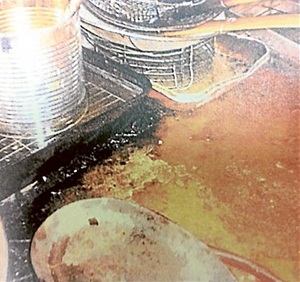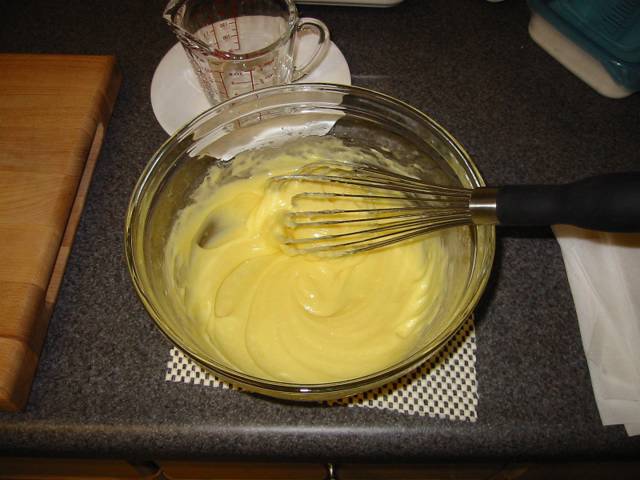Australia still has an egg problem.
Two weeks after raw egg in mayonnaise made at least 22 people sick with salmonella after eating at the Silo bakery in Canberra, owners Leanne Gray and Graham Hudson say they have stopped making mayonnaise for counter sandwiches, but still make mayonnaise for dishes where it can be kept in the .jpg) fridge. Silo has also changed its egg supplier.
fridge. Silo has also changed its egg supplier.
This will not prevent salmonella.
And without generalizing, Australia still has an egg problem.
Last week, four of the affected people were considering taking legal action, to claim expenses, loss of wages, and pain and suffering. State practice group leader for Slater and Gordon Gerard Rees was awaiting instructions from the four and for the final report from ACT Health, before determining whether a claim of negligence could be taken, on the basis that Silo knew or ought to have known of the likely salmonella outcome from eating raw egg.
”Silo is a very good cafe, as a general position it is a very popular cafe,” Rees said. ”This is the first time I’ve heard of a complaint of any kind involving them, so it’s not something against Silo – it’s just something that has occurred … If someone goes into a restaurant or cafe they’re entitled to have food that’s of an accepted standard and if they do suffer injury as a result, they’re entitled to make a claim.” Slater and Gordon would run the case on a no-win, no-fee basis.
It isn’t something that just occurred. It’s salmonella, it’s in raw eggs.
Hundreds of people have been sickened in Australia in the past five years from consuming undercooked eggs or dishes containing raw eggs.
A couple of new reports from Food Standards Australia New Zealand also raise the egg issue.
Microbiological surveys of raw egg-based products in Sydney and Western Australia cafes found no salmonella, but did find many instances of poor temperature and hygiene.
In Sydney, a total 107 samples of raw egg products were collected from 46 premises:
– 13 samples were classified unsatisfactory due to high standard plate counts and/or moderate levels of Bacillus cereus
– one sample of Caesar dressing was classified potentially hazardous due to a high level of B. cereus (31,000 cfu/g)
– Salmonella was not detected in any samples tested.
Information on food handling, product preparation, cleaning and sanitation and egg quality was obtained from 44 premises via on-site observation and questionnaire. The results show that:
– 10% of sauces were stored at ambient temperatures.
– 71% of samples had a temperature greater than 5°C (and less than 60°C)—constant movement of product in and out of refrigeration may be responsible for an elevated product temperature.
– 74% of products sampled were not date coded and 41% of products did not have a known shelf life policy at the time of inspection
.jpg) – most premises who separated eggs did so by hand; four used gloved hands and 24 used bare hands. Six premises separated eggs using the shells. In general hand washing after handling eggs was not considered as important as washing hands after handling raw chicken or meat.
– most premises who separated eggs did so by hand; four used gloved hands and 24 used bare hands. Six premises separated eggs using the shells. In general hand washing after handling eggs was not considered as important as washing hands after handling raw chicken or meat.
– 23% of premises had cracked or dirty eggs in storage and there seemed to be a distinct lack of knowledge about the quality of the egg, the risks associated with using cracked and dirty eggs, and the egg supplier.
– Only 52% of the food businesses stored whole eggs under 5°C.
Most businesses surveyed required improvement in:
– temperature control of raw egg products during and in between use
– date coding of raw egg products
– egg separation technique during processing to prevent cross contamination.
Chef Christian Hauberg told the Canberra Times that when a restaurant with the reputation of Silo is named as the source of a salmonella outbreak, Canberra’s restaurateurs take a keen interest.
”It sent shivers up my spine, to be honest. It’s the worst nightmare that people get sick from your food. But unfortunately with food-borne illnesses, you’ve got no idea if the product is contaminated when it comes in – you can’t tell by looking at it.”
Hauberg, from Pulp Kitchen, uses caged eggs in mayonnaise because he believes it reduces the risk of salmonella. ”I assume they’re safer,” he says, partly because free-range eggs might not be collected and refrigerated as quickly. He uses free-range eggs in cooked dishes.
Australian National University professor of infectious diseases and microbiology Peter Collignon says sanitizing the shell would presumably substantially lower the risk, since most contamination comes from the outside of the egg, but it wouldn’t deal with cases where salmonella is inside. There is no way of telling whether a chicken is carrying salmonella, and not enough data to indicate whether caged, free-.jpg) range or organic chickens are more or less likely to have it, he says, advising not to eat raw or runny-yolk eggs. When he eats mayonnaise, it comes in a jar from the supermarket. When he fries an egg, he flips it to cook both sides. He believes restaurants should warn people when food is made from raw eggs.
range or organic chickens are more or less likely to have it, he says, advising not to eat raw or runny-yolk eggs. When he eats mayonnaise, it comes in a jar from the supermarket. When he fries an egg, he flips it to cook both sides. He believes restaurants should warn people when food is made from raw eggs.
”Any egg, whether it’s commercial or free range, can be an issue. ‘My view is whatever egg I get from whatever source, it’s too hard to know, so I cook it.”
Like lots of foodborne illness, the risk may be low, but if it can be easily prevented, why not. And as the professor says, consumers really have no way of knowing.
Silo co-owner Leanne Gray says officials have since advised buying commercial mayonnaise or using pasteurized eggs. Her response: “That’s the foulest thing you’ve ever seen, so I said no, I won’t.’‘
Bring on the lawyers.
 plant in 2010 but have since gotten into a contractual dispute which has cost it $400,000.
plant in 2010 but have since gotten into a contractual dispute which has cost it $400,000.
.jpg) fridge. Silo has also changed its egg supplier.
fridge. Silo has also changed its egg supplier..jpg) – most premises who separated eggs did so by hand; four used gloved hands and 24 used bare hands. Six premises separated eggs using the shells. In general hand washing after handling eggs was not considered as important as washing hands after handling raw chicken or meat.
– most premises who separated eggs did so by hand; four used gloved hands and 24 used bare hands. Six premises separated eggs using the shells. In general hand washing after handling eggs was not considered as important as washing hands after handling raw chicken or meat..jpg) range or organic chickens are more or less likely to have it, he says, advising not to eat raw or runny-yolk eggs. When he eats mayonnaise, it comes in a jar from the supermarket. When he fries an egg, he flips it to cook both sides. He believes restaurants should warn people when food is made from raw eggs.
range or organic chickens are more or less likely to have it, he says, advising not to eat raw or runny-yolk eggs. When he eats mayonnaise, it comes in a jar from the supermarket. When he fries an egg, he flips it to cook both sides. He believes restaurants should warn people when food is made from raw eggs.(1).jpg) own targeted for the number or frequency of inspections.
own targeted for the number or frequency of inspections. unsafe food handling.
unsafe food handling..jpg) suitably trained food safety supervisors at premises. Additionally, closure notices will have to be displayed at the entrance of a food business served with a prohibition order.
suitably trained food safety supervisors at premises. Additionally, closure notices will have to be displayed at the entrance of a food business served with a prohibition order..jpg) federal capital, Canberra) health authorities to ensure the safety of its food.
federal capital, Canberra) health authorities to ensure the safety of its food..gif) The rate fell to 358 in 2009, but eggs are still responsible for more than a third of all foodborne outbreaks linked to salmonella in Australia.
The rate fell to 358 in 2009, but eggs are still responsible for more than a third of all foodborne outbreaks linked to salmonella in Australia. food standards code, omitting any regulations related to temperature control.
food standards code, omitting any regulations related to temperature control..jpg) between October 17 and November 4.
between October 17 and November 4..jpg) Charnwood Tai Ping Chinese restaurant.
Charnwood Tai Ping Chinese restaurant.(1).jpg) Wales, which includes Sydney, ACT and the federal capital of Canberra can apparently make its own rules – at least regarding restaurant inspection disclosure.
Wales, which includes Sydney, ACT and the federal capital of Canberra can apparently make its own rules – at least regarding restaurant inspection disclosure..jpg) Wales, which includes Sydney, ACT and the federal capital of Canberra can apparently make its own rules – at least regarding restaurant inspection disclosure.
Wales, which includes Sydney, ACT and the federal capital of Canberra can apparently make its own rules – at least regarding restaurant inspection disclosure..png) warm fridges.
warm fridges.